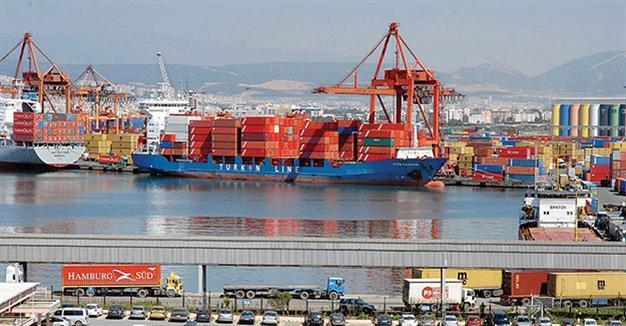Turkey’s foreign trade deficit narrows 25 percent in 2015 amid oil plunge
ANKARA

DHA Photo
Turkey’s foreign trade deficit narrowed by 25 percent year-on-year in the first 11 months of 2015 thanks to the decline in imports amid the drop in the oil price, according to data revealed by the Turkish Statistics Agency (TÜİK) on Dec. 31.The deficit narrowed to $57 billion in the January-November period compared to the same period of 2014.
Turkey’s exports in the first 11 months of this year fell by 8.4 percent to $132 billion from $144.3 billion in the same period of last year, while imports saw a 14.1 percent decline in the same period to $189 billion from $220.4 billion, according to provisional TÜİK data.
Exports were $11.7 billion in November, with a 10.2 percent decline from November 2014, and imports were $15.9 billion, a 25.3 percent decline year-on-year, according to the data.
The Turkish government set the foreign trade deficit target at $65.4 billion, but current figures signal a more optimistic climate.
The oil price drop and the continuing declining trend in commodity prices have played a big role in decreasing Turkey’s foreign trade deficit over this year, according to analysts. Oil prices have plunged by 35 percent year-on-year in 2015.
Turkey’s energy imports declined by 31 percent in the first 11 months of the year to $34.84 billion compared to the same period of 2014. Experts expect this trend to continue in the first half of next year.
Germany was again the top destination country for Turkey’s exports, worth around $12.3 billion in the first 11 months of the year, although this figure marked a drop of 12.2 percent compared to the same period of 2014, according to data compiled by Reuters.
Germany was followed by Britain with $9.8 billion and Iraq with around $8 billion. Turkey achieved an increase in its exports to Britain and the United States, but faced drops in eight of its remaining top 10 export destination markets, according to TÜİK data.
“The negative effect of the euro-dollar parity was around $750 million on exports in November and $11.9 billion in the first 11 months of the year, despite the rise in exports on an amount basis,” said Exporters’ Assembly of Turkey (TİM) head Mehmet Büyükekşi at a press meeting in the Central Anatolian province of Niğde in early December.
The value of Turkey’s 12-month exports saw a decrease of around 7.8 percent to $145.2 billion, according to a follow-up press release from the TİM.
















